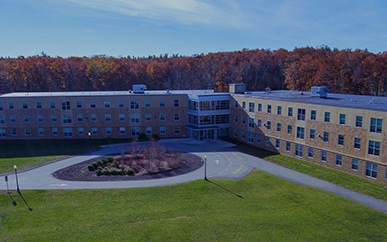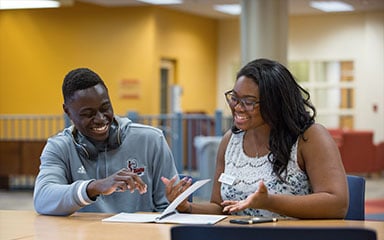Course Descriptions
AMC 100 First Year Seminar (3)
At Anna Maria College, the first year sets the foundation for a successful and fulfilling college experience. This immersive 3-credit course welcomes incoming students into a dynamic community dedicated to growth, belonging, and achievement. Students will develop essential academic skills like time management, effective study strategies, critical reading and thinking, writing and oral presentation, and information literacy while building resilience and a growth mindset. This course integrates personal wellness, community and belonging, financial literacy, and early career exploration to empower students to confidently navigate the college environment and launch their professional journeys. Interactive workshops, campus partnerships, and reflective projects foster a supportive network and prepare students to thrive as both learners and leaders. A grade of C or better is required for graduation.
ENG 103 Freshman Composition (3)
Freshman Composition (ENG 103) focuses more intensively on building student skills in critical thinking, reading, and writing. Its course goals include the development of analytical reading, thoughtful discussion, evidence-based arguments, composition, draft writing, self-editing, and research skills. By the end of the course, students will be prepared for all aspects of academic writing, including the essay, research paper, and the accompanying skills of developing a thesis and preparing a page of sources in varied academic styles (MLA, APA, and Chicago). A grade of C or better is required to move on to ENG 104. If a student does not achieve a grade of C or better within three counted attempts, they will be dismissed from the college. An attempt includes any instance of registration for the course, whether the student withdraws (resulting in a ‘W’ grade) or receives a grade of C- or lower. However, withdrawals due to documented medical emergencies will not count as an attempt.
PHL 110 Introduction to Philosophy (3)
An introductory examination, based primarily on writings of major philosophers, of central philosophical problems from historical, critical, and other perspectives. No background in philosophy is needed, only an open and inquiring mind. Pre-requisite ENG 103 (or ENG 102)
THE 210 Introduction to Theology (3)
Theology is an ongoing search for understanding and truth about God, humanity and all reality. It is a core discipline of the Catholic intellectual tradition. The study of theology involves a structured exploration of the Bible, Tradition and Church teaching. Topics studied in this course are: one God in three divine Persons; creation and new creation; sin and forgiveness; the Church and the communion of saints. This course builds on the introductory course in philosophy and also prepares students to take other theology courses at the college. Pre-requisite PHL 110
General Education Exploration Course Category Descriptions
Note: Faculty from different Schools and Programs apply to the General Education committee to request certification of courses to qualify as fulfilling requirements for Explorations category. Each semester eligible courses are listed on the Anna Maria College Online course search tool and visible within the College student web registration portal.
Explorations in Writing through Literature (3)
General education courses in the Explorations in Writing through Literature category introduce students to the essential tools for understanding and analyzing literary texts and writing insightful arguments about them. Students will examine language, ideas, and the cultural/political values of works of literature and what they reveal about our evolving, increasingly global society. Courses in this category use poetry, drama, and fiction/creative nonfiction texts to build on skills acquired in ENG 103 and increase proficiency in analytical reading, thoughtful discussion, evidence-based arguments, composition, draft writing, self-editing, and research skills. Students will be prepared for various aspects of academic writing, including the explication essay, comparative essay, and research paper with accompanying annotated bibliography. A grade of C or better is required for graduation. Pre-requisite: ENG103.
Explorations in Culture through Language (3)
The focus of Culture through Language courses is on learning about a particular culture through studying its language(s). Language enables us to think and to share knowledge, as well as to form social bonds. The study of languages and cultures promotes the value of ethical leadership by nurturing empathy for people from different cultures and empowering students to engage in today’s multicultural and multilingual communities.
Courses in this category may also concentrate on a world language in application to a field of study, major or career. The purpose of these courses is to train the student with the basic skills and cultural competency that will allow them to function as professionals more effectively and with greater understanding and empathy.
Explorations in the Natural Sciences (3-4)
Courses approved to meet this requirement focus on selected elements of the Natural Sciences, with particular emphasis on processes and mechanisms that underlie individual disciplines, including earth sciences, cosmology, biology, chemistry, physics, ecology, health sciences, and anthropology.
Explorations in Western Cultures and History (3)
Approved courses explore focus on the study of values, ideas, self-perceptions and aspirations by examining human creative expression during a specific period of Western history. These classes explore the philosophical and artistic heritage of the West by investigating the intellectual foundations of the defining works of literature, music and the visual and performing arts from each historic period. The exploration of interrelationships between the products of human imagination and the ideas that inspire their creation enables one to explore the west’s answers to the fundamental questions regarding the nature of humankind and the purpose of human existence in one of the four major historic eras of Western Civilization.
Explorations in Writing for Career and Creativity (3)
Anna Maria College recognizes that the ability to write effectively is a basic and increasingly important skill for college graduates, regardless of their major or career plans. The General Education Curriculum is designed so that all students will take at least three writing courses; for many students, this will include either a Professional Writing course or a Creative Writing course, both of which emphasize specialized writing. In these courses, students opt to further hone their writing skills.
Professional Writing (3)
Professionals in many fields are required to prepare a variety of reports, communicate with peers, and present projects, programs and other written products to a variety of audiences. This is a more specialized approach to writing than encountered in freshmen writing composition courses. Therefore, in this course the student learns to develop, draft and execute various forms of writing useful for an array of professions.
OR
Creative Writing (3)
The course blends building blocks of language, locale, apprentice, and artistic effort with a goal of strengthening writing skills that can lead to lifelong learning, expression, and publication. Students will have opportunities each week to explore topics, practice elements of writing, and complete formal examples of creative writing.
Explorations in Creativity and Imagination (3)
Courses identified as Explorations in Creativity and Imagination will contribute to the development of aesthetic responsiveness. These courses will present students with opportunities to analyze the objects and experiences which are identified in various societies as representative of beauty. As such, the courses are intended to contribute to cultural competency through the awareness of culturally conditioned perception and how selected cultures transmit meaning. In sympathy with the experience of beauty are the imaginative and creative processes which yield human artifacts that appeal to (or are repulsive to) the aesthetic sense and are intended to carry meaning. Students will have the opportunity to critically explore these processes and engage them through encounters with their application in cultural artifacts.
Explorations in Social and Behavioral Sciences (3)
General education courses in the Explorations in Social and introduce students to the systematic study of human behavior, both social and individual. Students investigate human behavior in its social context using scientific, qualitative and quantitative methods. Students use critical thinking skills to develop insights into the causal explanations for human behavior and to discuss institutional forces that influence society.
Explorations in the United States in the World (3)
The influence of the United States in the world is unprecedented in many areas, such as culture, military power, scientific development, and economics. At the same time, the USA is in continuous interaction with societies around the world, sometimes cooperatively and sometimes confrontationally. Courses in this category the USA from the inside and the outside by analyzing US social, political, legal, cultural and economic practices and institutions, and either compare those practices and institutions to those of other countries (in part to examine “American exceptionalism”) or explore the connections between the US and other societies. These courses will help students to understand the US as a heterogeneous and multifaceted nation situated within an international framework. These courses help prepare students for civic agency by framing the study of social, political, legal, and economic institutions of the United States in a historical and/or comparative context.
Explorations in Global Dynamics and World Cultures (3)
Courses in this category study global patterns and dynamics, including both western and non-western cultures, to acquaint students with values, customs, and institutions of multiple cultures and countries, with a strong emphasis beyond the west.
Courses in this category take one of the following approaches:
- to study global patterns and dynamics, and their concrete manifestations in specific societies outside of the United States
OR
- to acquaint students with values, customs, and institutions of other specific countries outside the US, and to explore how different beliefs, behaviors and ways of organizing society come into being
Explorations in Catholic Intellectual Tradition (3)
Intellectual pursuit has been a hallmark of Catholic theology over the past two millennia. These treasures include certain classic texts, art and architecture, music, as well as developments in science and technology. The other aspect of this tradition is the way human beings have learned to deal with experience and knowledge in order to acquire true wisdom, live well, and build good societies, laws and customs. Fundamental to this process is the understanding that faith and reason do not conflict. Rather, the continued pursuit of understanding leads ultimately to wisdom. Because the tradition is a living one, students will be invited to examine contemporary issues and the ways that theology continues to deepen the understanding of the Catholic heritage of faith and reason. (Adapted from a statement of the Association of Catholic Colleges and Universities)
Explorations in Quantitative Reasoning (3)
Quantitative Reasoning courses teach students how to think, write, and read mathematically in order to better understand the world and themselves. Approved courses include those from disciplines such as Business, Mathematics, Philosophy, and Fire Science.
Explorations in Ethics (3)
Courses in the Explorations in Ethics category examine fundamental principles, theories, and problems in moral philosophy. Ethics is concerned with investigating the characteristics of a life well lived, the sources of morality, and controversial moral and social questions. Students are introduced to the practice of ethical reasoning, consideration of the consequences of choices we make as individuals and as members of communities, and the complexities underlying ethical questions.
To be approved under this GenEd category, the treatment of ethics must be substantial rather than merely incidental and engage substantively with the literature in moral philosophy, that is, a course must clearly apply ethical theories to contemporary moral problems.
In addition to their intrinsic importance, courses in the Explorations in Ethics category support the Catholic intellectual tradition, broadly understood. “The Catholic intellectual tradition has consistently upheld the importance of moral formation and the cultivation of the virtues. This emphasis is reflected in the educational mission of Anna Maria College, particularly its liberal arts foundation combined with a focus on the service professions.” (Anna Maria College contemporary literacies)








